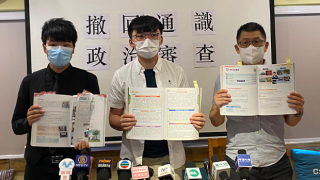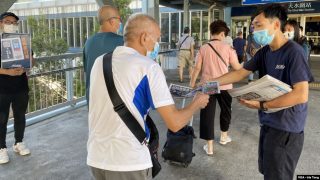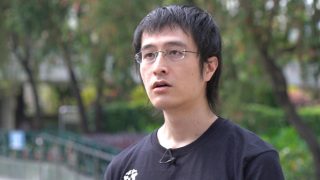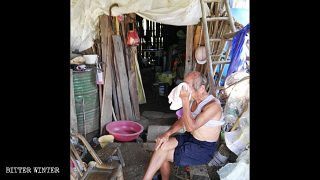Samuel Chu, one of six activists now living overseas who Hong Kong has reportedly issued arrest warrants for under its new national security law, has told VOA he will not stop fighting for democracy for Hong Kong.
According to China’s state television, Chu, an American citizen originally from Hong Kong who has lived in the United States for 30 years, and five other Hong Kongers who have fled the city for political reasons, are wanted by Hong Kong police for allegedly “inciting secession and collusion with foreign forces to endanger national security.”
Chu, 42, is a founder and managing director of Washington-based Hong Kong Democracy Council, which has lobbied the U.S. government to take action on China for the erosion of Hong Kong’s democracy.
The Hong Kong police and government have not officially confirmed the news. Hong Kong’s top leader, Carrie Lam, said Saturday it was “inconvenient” to comment on the enforcement of the national security law but said opposition to the Hong Kong or Chinese governments “is not a way out.”
The five others include Nathan Law, a pro-democracy campaigner and ousted lawmaker who recently fled to Britain, Simon Cheng, a former British consular staffer who was granted asylum in Britain after alleging he was tortured in China, and activist Ray Wong.
If confirmed, this would be the first time Hong Kong authorities have used the sweeping national security law enacted a month ago to target campaigners living outside Hong Kong.
Chu told VOA the authorities are trying to use the new law to intimidate and “create fear.”
Article 38 of the law says nonresidents can be prosecuted for acts outside of Hong Kong, implying that critics of China – including Hong Kong’s large diaspora – may face legal risks if they enter the city.
Chu is the first foreign national targeted by the law and he said he is “a test case” of how the law would work. He said neither he nor his family have heard from the Hong Kong or Chinese authorities.
China, he said, “is sending a threat to Hong Kong people that if you have connections [with the six activists], you might be implicated,” he said.
By pursuing him, though, the Chinese government is actually alerting Americans to the fact that not only Hong Kongers will be affected by this law, but also U.S. citizens, he said. The Chinese authorities are “provoking and inviting foreign response every time they use the law,” he said.
“Millions of people are now understanding that if they can go after us, they can come after anybody,” he said.
Chu said by aggressively targeting overseas activists, China has become “the greatest threat to [its] own national security.”
“The most egregious danger they have is the national security law because they’re inviting all kinds of actions against themselves,” he said. “They are inviting the U.S. to step up response, both politically and policywise.”
Chu’s 76-year-old father, the Reverend Chu Yiu Ming, a veteran pro-democracy activist who has helped activists from the 1989 Tiananmen crackdown escape abroad and a co-founder of the 2014 civil disobedience Occupy Central movement, was convicted and given a suspended sentence for his role last year.
China often harasses the families of dissidents or activists living abroad in exile to silence them. Activists also sometimes find themselves the target of harassment and intimidation by unidentified people, suspected to be security agents.
He insisted that as a U.S. citizen, it was his constitutional right to advocate and lobby the U.S. government.
“I would not stop what I’m doing,” he said. “They are not going to scare me into hiding and they’re not going to erase me from being able to speak out.”
“This is why we created the Hong Kong Democracy Council. We always knew there might come a time when the only free organization and voice for Hong Kong might be us,” he said. “It was created to be the last frontier to be able to speak freely.”
Chu, however, said he was “sad” that the trip he made to Hong Kong last year to attend his father’s trial “might be the last for a long time.”
Nathan Law, former chairman of the now-disbanded Demosisto pro-democracy group, would not comment for this article, but said on Facebook that the alleged national security crimes he was accused of breaching were “trumped up charges” and the result of him “loving Hong Kong too much.”
Law, 26, said he was saddened by the news in Hong Kong last week, which included the arrests of four student activists on national security charges, the disqualification of 12 pro-democracy candidates for the legislative election and now the wanted list that included his name.
“These are indications of our need to remain active on the global stage. That Hong Kong has no place for even such moderate views like ours underscores the absurdity of Chinese Communist rule,” he wrote.
In a poignant note that highlighted his fears over his family being implicated, he declared he would sever his relationship with his family, saying his advocacy work overseas was conducted in his own personal capacity.
Willy Lam, an adjunct professor at the Chinese University of Hong Kong, said China wants to send a message that it cannot accept Hong Kongers, even those abroad, lobbying foreign governments or organizations.
“They want to warn Hong Kong activists against pursuing international lobbying, otherwise they’ll arrest and extradite them,” Lam said. To foreigners, the message is “don’t interfere in Hong Kong affairs, otherwise you’d harm activists like Nathan Law.”
“China is very determined and is acting quickly. More people will be arrested in the near term. They will further silence and stop intellectuals and journalists from expressing opinions and target democracy activists,” he said.
Source: VOA



